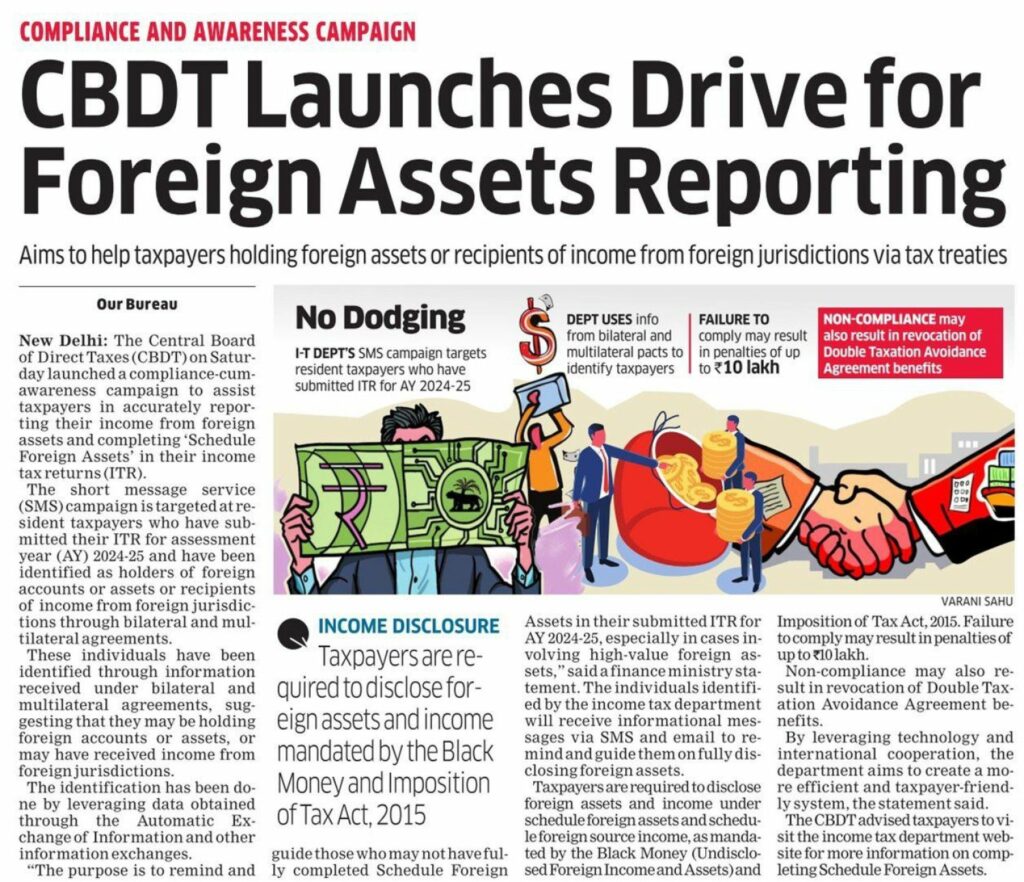
Penalty for Non-Disclosure of Foreign Assets in Income Tax Return (ITR) 2024
The disclosure of foreign assets in Income Tax Returns (ITR) is a critical requirement under the Indian tax laws. This measure ensures transparency, deters tax evasion, and aligns with global initiatives like the Automatic Exchange of Information (AEOI). Non-disclosure of such assets can attract severe penalties and legal consequences under the Black Money (Undisclosed Foreign Income and Assets) and Imposition of Tax Act, 2015 (“Black Money Act”). Here’s an overview of the penalties for non-disclosure of foreign assets in ITR for the assessment year 2024-25 i.e. financial year 2023-24.
Key Requirements for Reporting Foreign Assets
Taxpayers qualifying as residents and ordinarily residents (ROR) under the Income-tax Act, 1961, are required to disclose details of their foreign assets and income in Schedule FA of the ITR. The disclosure includes:
- Foreign Bank Accounts: Account details, balances, and interest income.
- Immovable Property: Address, cost, and other particulars of foreign real estate.
- Financial Interest: Investments in foreign entities, shares, and other securities.
- Trusts or Entities: Beneficiary details in foreign trusts or entities.
- Any Other Asset: Such as intellectual property rights, deposits, and loans.
Penalties for Non-Disclosure
1. Under the Income-tax Act, 1961:
If a taxpayer fails to disclose foreign assets or income in the ITR, the following penalties may apply:
- Penalty for Misreporting:
If the non-disclosure results in underreporting of income, a penalty equal to 200% of the tax evaded may be levied under Section 270A. - General Penalty under Section 271:
For failure to furnish accurate particulars, a penalty of up to ₹10,000 can be imposed.
2. Under the Black Money Act:
The Black Money Act applies specifically to undisclosed foreign assets and income. Penalties include:
- For Non-Disclosure:
A penalty of up to ₹10,00,000 can be levied, irrespective of whether the taxpayer has taxable income from such assets. - Prosecution:
Non-disclosure of foreign assets can lead to imprisonment for 3 to 10 years, along with fines. - Tax Liability:
Undisclosed foreign income is taxed at a flat rate of 30%, without any exemptions or deductions. - Additional Penalty:
If an asset is deemed undisclosed under the Black Money Act, an additional penalty of three times the tax payable may be imposed.
Voluntary Disclosure to Avoid Penalties
Taxpayers who have inadvertently omitted foreign assets or income should consider making a voluntary disclosure. By filing a revised return before the due date or during scrutiny, the penalty exposure can be reduced, and prosecution avoided.
If foreign assets and income were not disclosed in the original return for FY 2023-24, they can be declared by filing a revised return before December 31, 2024.
Global Collaboration and Enhanced Enforcement
India’s participation in global tax transparency initiatives such as the Common Reporting Standard (CRS) has increased the government’s access to information on foreign accounts and assets. Non-compliance is likely to be detected due to automated information exchanges between countries.
Steps to Ensure Compliance
- Review Past Returns: Ensure foreign assets have been correctly disclosed.
- Consult Professionals: Engage tax professionals for accurate reporting.
- Maintain Records: Retain documentation supporting ownership, income, and valuation of foreign assets.
- Timely Filing: File ITR before the due date, avoiding late fees and interest.
Conclusion
The penalties for non-disclosure of foreign assets are stringent, reflecting India’s commitment to combating black money and tax evasion. Taxpayers must be vigilant about reporting their foreign holdings to avoid penalties and comply with domestic and international laws. As global scrutiny increases, adhering to disclosure norms is not just a legal obligation but also a prudent financial practice.
